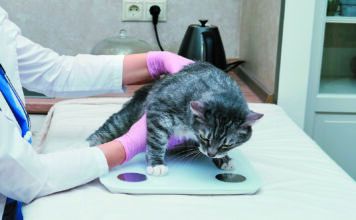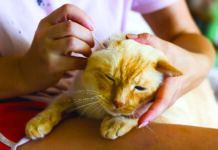Increased Thirst May be Something Other than Diabetes
People often assume increased thirst and drinking — medically termed polydipsia — results from diabetes, but it can have a number of other causes:
Download The Full March 2024 Issue PDF
- If Your Cat Were a Person, How Old Would She Be?
- The Meaning of “Veterinarian Recommended” on Cat Food
- New Guidelines for Helping an Itchy Cat
- Older Cat Less Active? Maybe Your Floors are Too Slippery
- If Your Cat’s Ears Look Dirty, Don’t Clean Them!
- Can Cats Use Facial Expressions to Signal Friendliness to Other Cats?
- Dear Doctor: Worried about dehydration; Cat’s got rhythm; Mental illness in cats.
If Your Cat Were a Person, How Old Would She Be?
Forget the old saw that the way to calculate a cat’s age in human ears is to multiply each year by seven. That simply won’t give you an accurate assessment of where your cat is at in life, say the American Animal Hospital Association and the American Association of Feline Practitioners (AAFP).
Why You Should Feed Your Young Kitten a Variety of Foods
Sometimes, to treat a medical condition, it’s necessary to change a cat’s diet. Diet changes can be a challenge with cats, however. They develop their food preferences very early on in life and may be reticent to adjust them. That’s why, until a kitten is about four months old, it’s a good idea to feed him a variety of foods — different flavors, shapes, and textures of both dry and wet. That way, if he develops an illness in adulthood that requires he eat food that’s different from what he’s used to, he will be less likely to resist the switch.
How to Make Your Cat Smarter
People tend to rate their cat’s intelligence by how much their pet interacts with them. Cats deemed smart are often those who spend time connecting with their people. But it may not just be a perception on our part.
The Meaning of “Veterinarian Recommended” on Cat Food
You know those television commercials that have a dentist in a lab coat recommending a particular toothpaste? Well, the marketing ploy has drifted over to products meant for our pets, in a manner of speaking. A number of cat food manufacturers have a burst in large letters on the front of their packages that says the product is “Veterinarian Recommended.”
New Guidelines for Helping an Itchy Cat
A healthy cat scratches himself for a total of about one minute per day, and he spends about one hour altogether grooming himself by licking his coat. Much more than that, and there’s a good chance something is wrong.
Older Cat Less Active? Maybe Your Floors are Too Slippery
Laminate and tiled floors and even wood flooring can prove very slippery for an old cat who’s not as steady as she once was. And that, in turn, can make her less likely to be active. If your cat is avoiding a particular room or space in the house that she used to frequent, consider putting a runner there. You might be happily surprised to find her confidently making her way across.
If Your Cat’s Ears Look Dirty, Don’t Clean Them!
You notice some gunk in one or both of your cat’s ears and are tempted to clean out the dirt. Don’t, especially not if the debris keeps accumulating, your pet’s ears smell bad, she’s scratching or swatting at them, or she keeps shaking or tilting her head. It means her ears are not just dirty. Something’s wrong that requires a veterinarian’s attention.
Can Cats Use Facial Expressions to Signal Friendliness to Other Cats?
There has been a fair amount of research on the faces cats make to communicate with people, along with research on their expressions when they are in pain. What hasn’t been well studied are their facial expressions to communicate their feelings to other cats.
Worried about dehydration
Q: I’m worried my cat is not drinking enough water. I never see her at the water bowl. She is on dry food. Should I try to switch her to canned food or other moist cat food that contains more water than dry?
Mental illness in cats
Q: Is it possible for cats to have mental illness, or is it always just a matter of behavioral issues?















